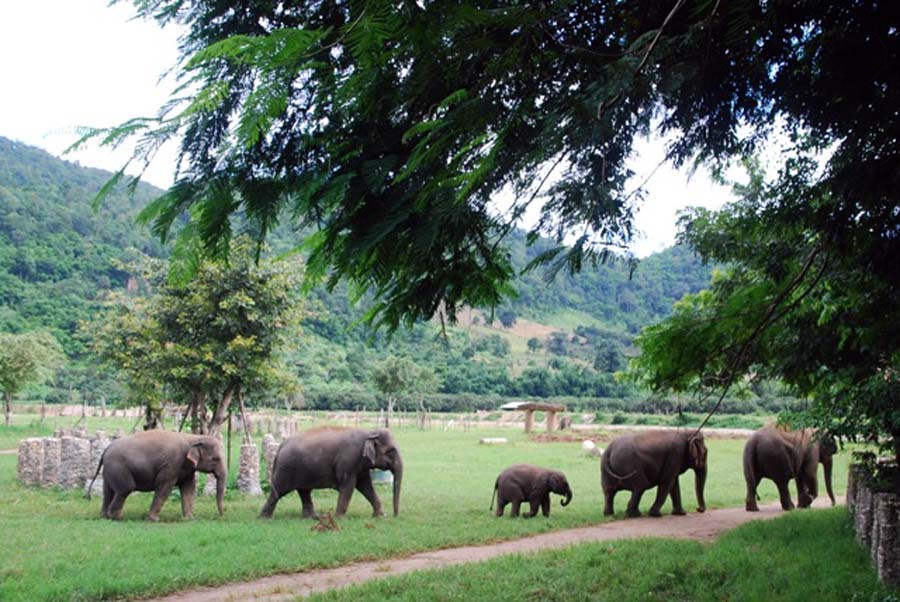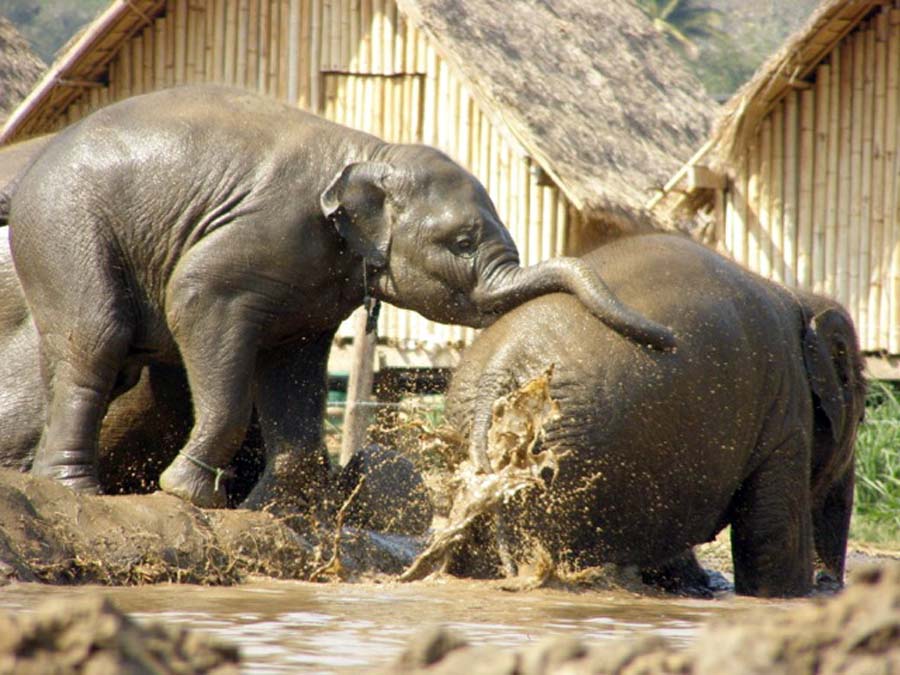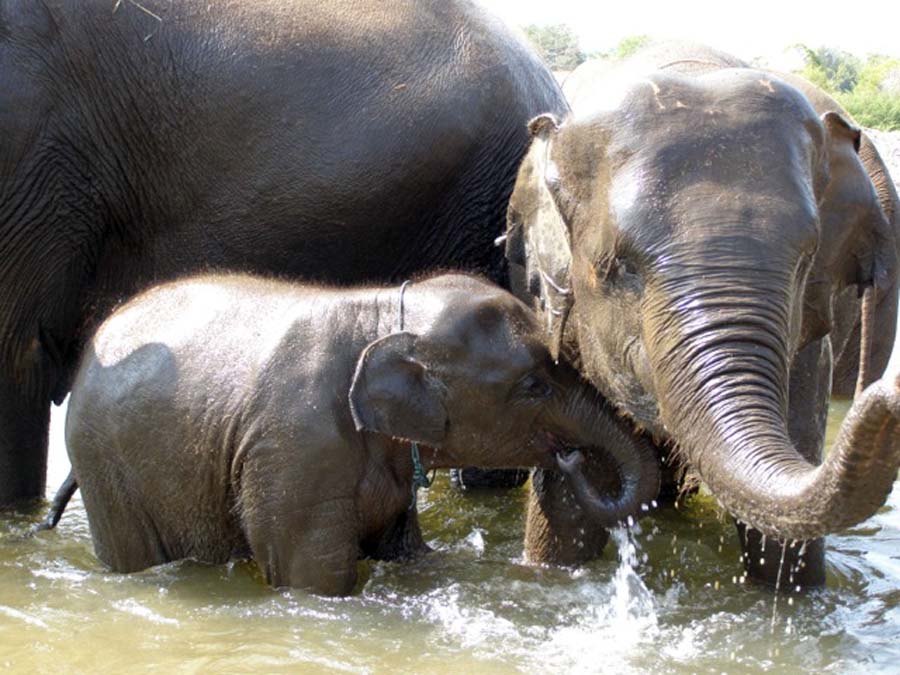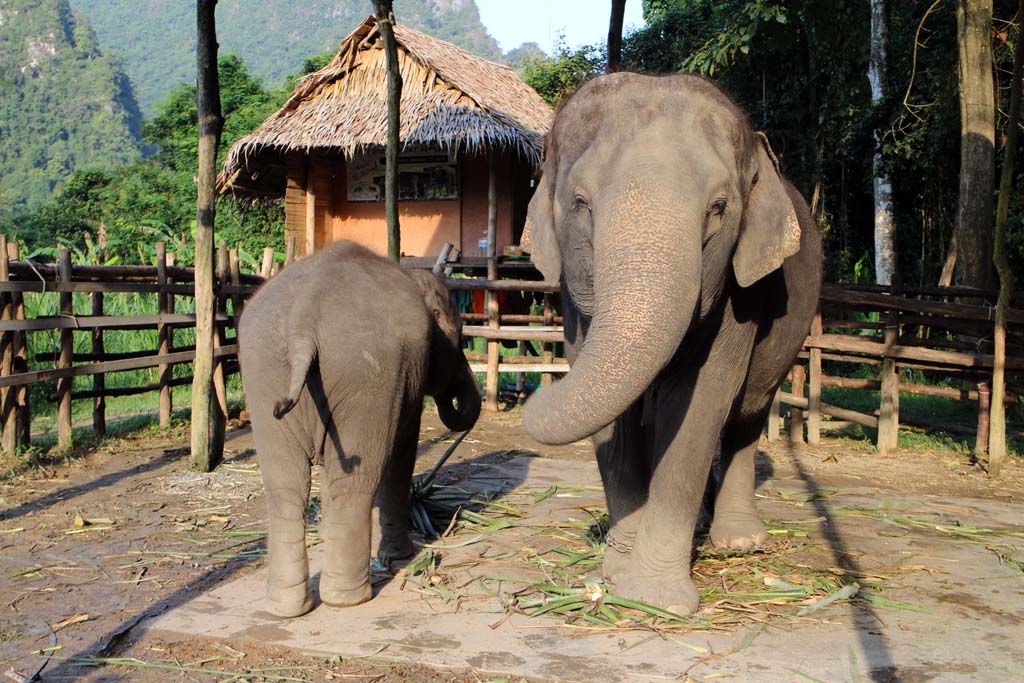Support elephant camps and sanctuaries that put the welfare of their animals first, advises Julie Miller.
Elephants and Thailand are closely intertwined – pachyderms have helped shape the Kingdom of Thailand, are part of its history and culture, and are an important element of its tourism industry.
After logging was banned in Thailand in the late ‘80s, most of Thailand’s population of captive elephants [*NB – technically, Asian elephants are wild animals, hence any elephant living under human care is considered ‘captive’ rather ‘domesticated] found new employment in the tourism industry, carrying people through the jungles on organised treks or performing in ‘shows’ displaying their incredible intelligence and trainability.
In recent years, however, animal welfare research has highlighted that many of the activities once considered acceptable in the name of entertainment are, in fact, demeaning and cruel to the animals. A baby elephant dancing and performing on cue may be cute, but the reality is, this little creature has been taken away from its mother prematurely, may have been trained via cruel methods and is actually performing unnatural acts, all for monetary gain.
With tour companies such as Intrepid Travel leading the charge, there is now a shift away from supporting elephant camps offering trekking and animal shows; instead, tourists are increasingly being offered opportunities to interact with the elephants on a more intimate level, becoming involved in the daily care of the animal and learning about the special relationship between the elephant and its mahout.
So if you’re keen on having a meaningful, enjoyable and gentle interaction with an elephant on your next holiday in Thailand, consider visiting one of these ethical sanctuaries:
1. Golden Triangle Asian Elephant Foundation, Chiang Rai: Located at the Anantara Golden Triangle Resort, this camp provides a home and employment for over 30 former street elephants, mahouts and their families. Activities for guests at the resort include the daily care of the elephants, helping to bathe the elephants in the river, learning to ‘drive’ the elephants like a real mahout and ‘Walking with Giants’, a forest trek with elephants, accompanied by a resident veterinarian or biologist. See www.goldentriangle.anantara.com
2. Elephant Nature Park, Chiang Mai: This lovely acreage on the outskirts of Chiang Mai provides sanctuary for over 30 elephants, many of them victims of abuse and mistreatment. Here, visitors can watch elephants being elephants, interacting in their herd, playing with each other, and bathing in the river. There is a day guest program that includes feed and bath time, plus the park has a wonderful volunteer program for those wanting a longer, more intimate experience and don’t mind a bit or hard work! See www.elephantnaturepark.org
3. Elephant Haven, Kanchanaburi: Under the tutelage of Lek Chailert from Elephant Nature Park, this brand new facility at Sai Yok, 130 kilometres west of Bangkok, has taken the chains off six elephants from a local trekking camp, with the plan eventually to rehabilitate another 49 from the camp. Visitors and volunteers are welcome at this fledgling sanctuary, see elephantnaturepark.org.
4. Elephant Hills, Khao Sok: This luxury tented rainforest camp on the fringe of Khao Sok National Park in Thailand’s south offers an interactive experience with its resident herd of 12 Asian Elephants, with guests participating in bathing and feeding the elephants. Two and three-day jungle safaris are available, including accommodation, meals and elephant activities. See elephanthills.com
5. Phang Nga Elephant Park, Phang Nga: This is the newest elephant park in Phang Nga, attracting tourists from Phuket and Khao Lak. Family-run, this small business started their sanctuary so their small herd of domesticated elephants could be provided with the highest quality of life, with visitors encouraged to interact one-on-one with the elephants. There are half and full day packages available which include looking after ‘your’ elephant for the day and a Thai cooking class. See www.phangngaelephantpark.com
*Photography by Julie Miller.









the term captive elephant can’t describe the Thai elephants mentioned in the blog. The elephants were bred, born and raised by people. They have not been caught in the wild and put in cage. Domesticated elephant is a more appropriate term. IMHO.
Many thanks for your feedback – we’ll pass it on to the author.
Calling Asian elephants ‘captive’ rather than ‘domesticated’ is not the author’s opinion, but an official definition made by evolutionary biologists.
If you are going to appeal to authority in this way, then you should easily be able to provide me with a direct quote from an evolutionary biologist equating inter-species codependency with the captive status of some individuals within a species.
“Captive” is not only a biological term. It’s defined by Miriam Webster as “kept within bounds”. So that really could vary depending on the camp you are speaking of, to whether they are “captive” or free to roam. Those who are free to roam would not be “captives”. For example, you are not a “captive” at Starbucks just because you like their coffee and keep going there every day. But if a pen is used to house them in the evening, or a rope, etc. that would certainly be “captivity”.
Actually as a vet having volunteered at some on the sanctuaries mentioned in this blog I can testify that a significant proportion of these elephants have been brutally taken from the wild and essentially put in cages so “captive” describes them perfectly.
Which sanctuaries in particular are you referring to, Louise? I’m doing research for an upcoming trip and I want it to be as ethical as possible. So far the one I’ve read the MOST good things about is the Elephant Nature Park.
It’s possible some of the elephants that are now living in Thailand’s sanctuaries were originally taken from wild, either to work in ‘elephant camps’ (or maybe even earlier in the lumber trade), but they are now being looked after responsibly in these sanctuaries. It is not the sanctuaries that have taken them from the wild. More and more former ‘elephant camps’ are being transformed into sanctuaries, thanks largely to the efforts of Lek Chailert from Elephant Nature Park.
I went to an elephant trek yesterday in Phuket near the Big Buddha statue and instantly regretted it after seeing how they’re treated. There was a poor baby elephant chained by foot at the front with minimal movement allowed. Is there anything that can be done? Is there anyone that can help the poor baby elephant?
Thank-you for your concern. We suggest the best course of action would be to report the operator to the Thai Elephant Conservation Centre, by email: info@thailandelephant.org or on their website: http://www.thailandelephant.org/en/contact.html
I’ve been in Phuket for a while and visited the Big Buddha a few times. Whenever I see the elephants my heart breaks but like you I have no idea what to do about it. I give the tourist an evil eye and try to convey my disgust with body language but that doesn’t help anyone I guess.
I know exactly which one you are referring to. I drove past it yesterday and saw a baby elephant chained up by the foot, so I stopped to see it and it broke my heart, the guy wanted 100Baht to just feed it
I drove to big Buddha yesterday and saw probably 3 or 4 elephant places. they all had baby elephants chained at the foot in the front of the establishment to attract tourist. The Buddha was supposed to be a positive experience and instead I left angry and disgusted, specially because I had to drive back down and see it all again!
Do you know if this is Elephant Jungle Sanctuary? I’ve looked online and have come across this one online and they have one in Chaing Mai and one in Phuket, I really want to go to a sanctuary but obviously don’t want to see anything like this.
Good on you for looking for the ethical ones! My friend works at this one: http://www.phuketelephantsanctuary.org/ it’s the first ethical one in Phuket
Congratulation for your post.
Do you know if this is Elephant Jungle Sanctuary? I’ve looked online and have come across this one online and they have one in Chaing Mai and one in Phuket, I really want to go to a sanctuary but obviously don’t want to see anything like this.
Hi,
I too am curious about The Elephant Jungle Sanctuary. We are planning on visiting in December, and ran across their website. If they have a bad reputation for the treatment of elephants, I do not want to book a tour with them, as we do not wish to see any elephants harmed or abused. We only have a day that we can set aside and if there are any suggestions for a 1 day tour in Phuket, please let me know. Thank you.
Hi Maya, I suggest PHUKET ELEPHANT SANCTUARY, which was founded through a partnership with Mr Montri Todtane, a Phuket elephant camp owner, world-renowned elephant rescuer and conservationist Lek Chailert, founder of Save Elephant Foundation, and Louise Rogerson, founder of EARS Asia. Lek Chailert also founded Elephant Nature Park in Chiang Mai, which is mentioned in this blog post. They do half-day trips which include lunch. http://www.phuketelephantsanctuary.org/
If you have more time I also highly recommend a couple of days at Elephants Hills – it’s an amazing experience! http://www.elephanthills.com/
Phang Nga Elephant Park, Phang Nga
I just would like to know if this park I have listed above is in fact ethical or not. I have been the the Elephant Nature park in Chaing Mai and felt the elephants were very well looked after. Not rope around their necks, no manhout with sharp tools to poke or “guide” the elephants and no interaction from the tourists towards the baby elephants as we were advised this is wrong and only meant the parents would allow it if they had been abused into doing so.
I have been sent photos from thr elephant park in Phang Nga which include elephants behind an electric fence, elephants which rope around them long enough for them to wander 30ft, manhouts with sharp dagger ended sticks and 2 people each riding one elephant sat on the wooden chairs. All of the above we were told at Elephant Nature Park is highly damaging to the elephants.
Can you please clarify if this is indeed an ethical camp like you suggest?
Thank you
Hey Nicola, I read your post with interest, have you had a response at all, regarding the treatment of Elephants in Phang Nga? Thanks
Hi Debi,
I have asked the author to check this – I’ll follow up now and see what she has found out.
Cheers.
There are several elephant camps in Phang Nga, and sadly not all of them treat their elephants well. While tourists can ride the elephants at Phang Nga Elephant Park, it is always on the back of the neck, and not with one of those wooden saddles. So I think Nicola must have seen images of one of the other camps.
Unfortunately most of what Nicolas said was in fact true. We visited this park and indeed an elephant was behind an electric fence and all elephants had ropes around them. The wooden chairs for riding were used at the same site, but we were told that the contract for them was about to expire and would not continue. Although I think their intentions may be better than other places, they have a lot to achieve before it should be considered truly ethical and it may be misleading to place them amongst the top 5.
Thanks for the feedback Rebecca, we’ll look into updating this post as soon as possible.
I am booking a trip to Elephant Hills in December. It sounds like the best of these Parks, based on what I have read. Sounds like an experience to behold and to embrace the tropical environment that surrounds it.
Any feedback would be appreciated!
Laura
Hi Laura,
We visited last year and just loved it. We stayed in both camps – the rainforest camp and the floating rafts on Cheaw Lan Lake.
When we arrived we were shown a documentary about the plight of Asian elephants, which explained their habitat loss and former mistreatment as domestic animals. The next day after rafting down river, they showed us how to feed and wash the elephants – none were chained and their mahouts seemed to treat them very gently.
That evening school kids from the local village performed for us – it was a fantastic experience. The floating camp was amazing too – surrounded by jungle, we saw hornbills, gibbons and macaques in the trees surrounding us – amazing!
Hi Laura, there’s more information about Elephant Hills here: https://thailand.net.au/elephant-hills-award-winning-elephant-safari-tours-thailand/
Hi there!
I volunteered with the Golden Triangle Asian Elephant Foundation in Chiang Rai, It is an incredible place. It is possible to find places of ethical mind that still embrace the tradition of being a mahout without submitting the elephants to repeated stress, exhaustion and containment.
Whilst the tradition of being a mahout exists (and it will for a few more generations) it’s important to find work for them that looks after them, their families, their elephants and their future. This is what GTAEF does! You will not regret it! ‘Mahout Training’ which is a very popular activity (riding on the neck of the elephant) for one hour down to the river with rotated elephants 3 times a day. We (as volunteers) found that people staying with the attached resort (ANANTARA) actually enjoyed walking and bathing with the elephants a lot more than riding them which was extremely positive and eye opening for us, it allows you to feel somewhat close or bonded to the elephants simply enjoying sharing their space.
I blogged during my time with them feel free to check it out 🙂 I spent two months volunteering at different ethical places around asia.
http://www.jenventura.com/blog/2016/3/14/golden-triangle-asian-elephant-foundation-part-i-13316
http://www.jenventura.com/blog/2016/3/22/golden-triangle-asian-elephant-foundation-part-ii-16316
Dear Mr Admin,
My name is Stefania Sil, I am a student at the Saxion University of Applied Science in Deventer, Netherlands.
Currently I am working on a research paper about the captivity of elephants in Thailand. The purpose of this project is to develop a policy framework for tourism companies by displaying the positive and negative impacts of the “ABTA minimal guidelines”, the Thai culture and the Thai animal welfare laws regarding the lives of captive elephants in Thailand.
The final version of this report will be sent to “Global Spirit”. This company is a consultant specialized in animal welfare, which supports the travel and tourism industry to responsibly manage the animal welfare within their animal attractions.
To make this possible I need to reveal the importance of elephants in Thai culture and elephant needs in captivity, mahouts, etc. For this reason, I would like to ask if someone in your department would be interested in contributing with this research by participating in a 30-minute interview.
Below you will find the research questions. Do not hesitate to contact me if you need more information.
Thank you in advance for your time and I hope to hear from you soon.
Kind regards,
Stefania Sil
Management question: How can Global Spirit establish a policy framework regarding elephant welfare in camps and sanctuaries located in Thailand, in order for their stakeholders to implement it in their tourism product?
Central question: What is the current situation in Thailand regarding elephant welfare in tourism products?
I wholeheartedly support Elephant Nature Park since I volunteered there for 7 days this past November. They truly care for their elephants. If you’re unable to visit Chiang Mai, they have projects/activities in other locations so check out their website.
I also recommend Phuket Elephant Sanctuary at http://www.phuketelephantsanctuary.org/
since they’re affiliated with Elephant Nature Park
Hi! I will be traveling to Thailand in February with a group of veterinarians from the US… We would like to visit an ethical elephant sanctuary, preferably one that takes care of injured elephants and rehabilitates them, we would also like to learn about elephant medicine while we are there… any thoughts on which place to visit? I know about Elephant Nature Park but would rather avoid the touristy places, thank you!
Hi Karla, it would probably be best to contact the Thai Elephant Conservation Centre for advice: info@thailandelephant.org or http://www.thailandelephant.org/en/contact.html
Is there an elephant sanctuary in Koh Samui? We are going to be there in September and instead of an elephant trek, I’d like to visit a sanctuary instead.
Hi Kathy, we’d recommend an overnight trip from Samui to Elephant Hills. It’s a 5.5-hour drive (they provide transfers) so it’s a very early start but a fantastic experience, sleeping in luxury tented accommodation, where you’ll learn a lot about these amazing animals, including how to feed and bath them. Find out more here: http://www.elephanthills.com/
Hello,
We will be in Phuket and would like to visit an ethical sanctuary.
We were considering ‘Elephant Jungle Sanctuary’ or ‘Phuket Elephant Sanctuary’?
any advice on which one is more ethical.
We read on a review that Elephant Jungle Sanctuary had the elephants roped up , unable to roam. I really don’t want to pay to see that.
Thank you
Hello Mike,
The author (and several comments) recommend Phuket Elephant Sanctuary, which was founded through a partnership with Mr Montri Todtane, a Phuket elephant camp owner, world-renowned elephant rescuer and conservationist Lek Chailert, founder of Save Elephant Foundation, and Louise Rogerson, founder of EARS Asia. Lek Chailert also founded Elephant Nature Park in Chiang Mai, which is mentioned in this blog post. They do half-day trips which include lunch. http://www.phuketelephantsanctuary.org/
i am elpoing to thailand very soon and instead of funding somone who may not take care of their elephants i want to find a park or sanctuary that would allow an intimate photo experience with a loved elephant. what would your best suggestion be .. it will just be myself my partner and my son .. all massive animal lovers
Hi Monique – which part of Thailand will you be visiting?
That is actually our article this week. We just visited Elephant Hills last December and came in from Koh Tao so our ferry stopped at Samui on the way over. The tour was a perfect combination of luxury, ecology and ethos. If you have time in the schedule, the overnight glamping at Cheow Lan lake with Elephant Hills was rewarding as well.
Hi,
We’re looking to go to an Elephant Sanctuary for 2days/1night around Chiang Mai in April. However the one we know of – Elephant Nature Park, is fully booked. Any suggestions of other places where they treat the elephants well?
Thanks
If you can touch the elephants and if anyone is riding the elephants or telling them where to go and when (as most of the places listed here do) then it is NOT genuine or ethical. It’s just cashing in on the demand for “Eco-tourism”
Having been to Phuket Elephant Sanctuary (also founded by Lek) I’m glad that there are these five reputable, trustworthy and ethical operators in Thailand as alternative to elephant riding camps.
Thank you,
Rene